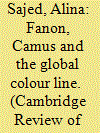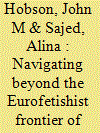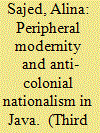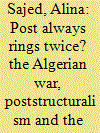|
|
|
Sort Order |
|
|
|
Items / Page
|
|
|
|
|
|
|
| Srl | Item |
| 1 |
ID:
109169


|
|
|
|
|
| Publication |
2011.
|
| Summary/Abstract |
This article challenges the liberal assumption that socialist societies were closed or isolated entities, and that it was the 1989 revolutionary moment that both freed them and integrated them into global dynamics. Everyday encounters with a particular vision of the global had already shaped the political imagination of ordinary Romanians prior to 1989. Such encounters constituted their instruction into concepts of liberalism and the liberal subject, freedom and democracy. By looking at informal (and illicit) networks of consumption of both goods and ideas (such as tuning into Radio Free Europe and Voice of America), I seek to explore the sensorial dimension of everyday politics in communist Romania and to illustrate how such a sensorial experience reinforced the imagined distance between a free and prosperous 'outside' and an impoverished and oppressive 'inside'. I use Michel de Certeau's theorizing on the everyday, and Ashis Nandy's preference for the 'non-player' as the ordinary hero of violent political projects, to go beyond the framework of power and resistance, and to explore the more nuanced practices of coping, survival and subversion.
|
|
|
|
|
|
|
|
|
|
|
|
|
|
|
|
| 2 |
ID:
120444


|
|
|
|
|
| Publication |
2013.
|
| Summary/Abstract |
I focus here on the political stances of Frantz Fanon and Albert Camus regarding the Algerian War of Independence. By examining their reflections on this violent anticolonial struggle, I seek to highlight the role of colonial difference and of racial hierarchies in the constitution of global politics. Fanon's position relies on an ethos of decolonization and on an ethics of difference that-while specific to the Algerian context-also reverberated profoundly among other societies caught in the violence of imperial encounters. Camus' conciliatory approach, however, and his moral equalization of the violence perpetrated by both sides enunciate the inherent racial hierarchies underpinning liberal narratives. I argue that the limits inherent in Fanon's thought-but also its latent potentialities for decolonial thinking-become apparent when examined through the lens of the contemporary activism among North African migrants and their descendants in France. The emergence of self-proclaimed decolonial movements constitutes an attempt to enact a decolonial transnational citizenship, which contests the racial boundaries of French Republicanism. But it also signals a different vision of the universal-one that is entrenched in a terrain of historical specificity and which holds more promise in contesting the global colour line.
|
|
|
|
|
|
|
|
|
|
|
|
|
|
|
|
| 3 |
ID:
157535


|
|
|
|
|
| Summary/Abstract |
This article argues that Critical IR theory’s (CIRT) claims to reflexivity, its engagement with “difference,” and its emancipatory stance are compromised by its enduringly Eurocentric gaze. While CIRT is certainly critical of the West, nevertheless its tendency toward “Eurofetishism”—by which Western agency is reified at the expense of non-Western agency—leads it into a “critical Eurocentrism.” While this Eurofetishism plays out differently across the spectrum of CIRT, nevertheless all too often the West is treated as distinct from the non-West such that a fully relational conception of the West—one in which the non-West shapes, tracks, and inflects the West as much as vice versa—is either downplayed or dismissed altogether. Our antidote to this problem is to advance such a relational approach that brings non-Western agency back in while simultaneously recognizing that such agency is usually subjected to structural constraints. This gives rise to two core objectives: first, that non-Western agency needs to be taken seriously as an ontologically significant process in world politics, and second, that it needs to be explored in its complex, manifold dimensions. Here we seek to move beyond the colonial binaries of non-Western “silence vs. defiance” and an “all-powerful West vs. powerless non-West.” For between these polarities lies a spectrum of instantiations of non-Western agency, running from the refusal to be known and categorized by colonial epistemes to mundane moments of everyday agency to the embrace of indigenous cosmologies through to modes of developmental and global agency. Sometimes these speak back to the West, and at other times they occur for reasons Other-wise. Ultimately we call for a relational sociology of global interconnectivities that problematizes CIRT’s Eurofetishization of the West as a separate, self-generating, self-directed, and hyper-autonomous entity.
|
|
|
|
|
|
|
|
|
|
|
|
|
|
|
|
| 4 |
ID:
151509


|
|
|
|
|
| Summary/Abstract |
This analysis investigates the limits of colonial modernity in the 20th century Dutch East Indies at a time that coincided with the building of the Indonesian national project. I am interested in the constitution of the national teleology as an inexorable socio-political project, deploying specific racial and gendered economies. As a locus of investigation I choose the literary narratives of two celebrated Indonesian intellectuals (and participants in the anti-colonial struggle), Pramoedya’s Buru Quartet and Mangunwijaya’s Durga/Umayi. Were the impulses of anti-colonial resistance intrinsically national in their orientation? Through what erasures and re-appropriations has the nationalism/modernity paradigm become the medium of decolonisation?
|
|
|
|
|
|
|
|
|
|
|
|
|
|
|
|
| 5 |
ID:
117838


|
|
|
|
|
| Publication |
2012.
|
| Summary/Abstract |
This article makes the case for rethinking the relation between poststructuralism and postcolonialism, by building on the claims advanced by Robert Young, Azzedine Haddour and Pal Ahluwalia that the history of deconstruction coincides with the collapse of the French colonial system in Algeria, and with the violent anti-colonial struggle that ensued. I choose to examine narratives of theorists such as Derrida, Lyotard, and Cixous because not only they provide the link between colonial violence, the poststructuralist project that ensued, and postcolonialism, but also because the problems I identify with their projects are replicated by much poststructuralist work in International Relations (IR). I signal that one of the most significant consequences of conducting poststructuralist research without attention to postcolonial horizons lies in the idealisation of the marginalised, the oppressed or the native without attending to the complexity of her position, voice or agency. Bringing these theories together aims to highlight the need for a dialogue, within IR, between poststructuralism's desire to disrupt the disciplinarity of the field, and postcolonialism's potential to transcend the self-referential frame of IR by introducing perspectives, (hi)stories, and voices from elsewhere.
|
|
|
|
|
|
|
|
|
|
|
|
|
|
|
|
| 6 |
ID:
167656


|
|
|
|
|
| Summary/Abstract |
This article re-examines Third Worldism as a political ideology, with a specific focus on a number of Algerian intellectuals. By taking Algeria as a privileged locus of investigation, the discussion zooms into a specific context of Third Worldism, the Algerian War and the decade after, therefore focusing on the period between the 1950s and the 1970s. Here I understand Third Worldism to mean more than the instantiation of the postcolonial state through anticolonial liberation struggles. Rather, I take into consideration (Algerian) voices that push against the rigid boundaries of methodological nationalism and postcolonial theory. By embracing the ethos of ‘affirmative critique,’ the analysis aims to bring to light those ‘forgotten, hidden or invisible acts of critique’ that expose under-currents of Third Worldism not usually discussed or engaged. Thus, I engage writings of rarely considered Third World intellectuals, such as Kateb Yacine, Jean Amrouche, Jean Senac. These are all Algerian intellectuals; the reason behind this focus is the following: their involvement in Algeria’s decolonization struggles translated into translocal solidarity with other decolonization projects, whether in Vietnam or in Palestine. Aside from gesturing toward a translocal spatiality, their writings also embody a more genuine retrieval of dignity by the colonized, and an alternative memory of a different Algerian nation, intrinsically plural and hospitable to difference. Put differently, these voices both attempt a kind of diagnosis (however partial and incomplete) for the reductionism into which the Third World liberation state (inevitably) fell, while suggesting an alternative political horizon that comes closer to Fanon’s idea of ‘national consciousness’, especially in its attention to the ‘international dimension.’1
|
|
|
|
|
|
|
|
|
|
|
|
|
|
|
|
|
|
|
|
|